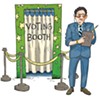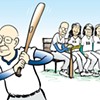Published June 16, 2021 at 10:00 a.m.
Lovin' Spoonful
Your story about Val Hussey, the "lunch lady," brought tears to my eyes ["Pandemic All-Stars," June 9]! They may never know of her on national news, but that kind of dedication to preventing children from going hungry — helping parents feed their families during financial struggles — is what really makes a difference. She is totally a hero.
Ginger Vieira
Essex Junction
Remembering Dad
[Re "Alive to Tell the Tale," May 26]: Reading your excellent piece about Vermont World War II vets reminded me of my father. He was born in Tuscany and emigrated as a little kid with his family, settling in Montpelier in 1909. In 1942, after Pearl Harbor, at the age of 37, weighing perhaps 120 pounds soaking wet and wearing eyeglasses with lenses as thick as the bottom of a Coke bottle, he enlisted in the Marine Corps. He went through boot camp at Parris Island, South Carolina, with kids half his age and was honorably discharged in 1946 as a staff sergeant.
I asked him once why he enlisted when he could have checked a half dozen deferment boxes. His answer was simple: "Oh, I had to."
Enough said.
J. Paul Giuliani
Montpelier
Beautiful Tribute
"Alive to Tell the Tale" [May 26] was beautiful. The recollections of these men would be lost if not for your interviews. War is horrible, yet these men survived, and the rest of us owe them a debt of gratitude for preserving our country.
Sue Wetmore
Brandon
Poor Pay
I was struck by Mark Johnson's comment in his June 2 Fair Game column: "Pay in the newspaper business is notoriously low. (I made $19,000 a year when I started at the Burlington Free Press in the 1980s. You work hard and pay your dues.)"
I find this attitude of "work hard and pay your dues" coming from an older generation misleading and unfair. Adjusted for inflation, a starting salary of $19,000 in 1982 would be about $53,000 today; if Johnson had started at that salary in 1985 or even 1989, that salary would respectively be about $47,000 or $40,000 now — all well above the $34,000 starting salary discussed in the column.
For the first time in recent history, young people are experiencing less economic prosperity and opportunity than their parents. Attitudes like Johnson's, even throwaway comments like the one he made, only serve to further culturally perpetuate this problem.
Joyce Cellars
Burlington
'Mean and Hypocritical'
[Re Off Message: "Scott Vetoes Noncitizen Voting Proposals, Signs Bupe Bill," June 1]: Gov. Phil Scott's vetoes of the Montpelier and Winooski non-U.S. citizen voting charter changes are both mean and hypocritical. Not four months ago, Scott wrote the U.S. Department of State asking to triple the number of refugees sent to Vermont. "Refugees are an integral part of our efforts to grow Vermont's economy," Scott said at the time. By vetoing a charter change that expands voting rights and encourages public participation, Scott sends the message that refugees are welcome for their labor, but we have no intention of giving them a meaningful voice in their communities.
The path to citizenship is long and burdensome, particularly after four years of restrictive Trump policies that have created a massive backlog. Many of our immigrants in Montpelier and Winooski have been legal, permanent residents for years. They pay taxes and their children attend our schools, yet they are denied a vote in local decision making.
As Vermonters, we can give the governor credit for his handling of the pandemic without offering a blanket free pass on issues like these. Scott's first state Senate campaign centered on opposing civil unions, and while he's "evolved" on that stance, he continues to veto core progressive policies that benefit working Vermonters, such as a minimum wage increase and paid family leave. While he may stray from the Republican platform by opposing local control in this case, make no mistake: The R certainly belongs next to his name.
Conor Casey
Montpelier
Casey is a Montpelier city councilor.
Ad Logic
I've been following the discussion around readers asking you to stop accepting ad dollars from cigarette companies [Feedback: "Ban Cigarette Ads," June 2]. These ads don't bother me. I am not a smoker. I don't see how these advertisements are any different than ones for alcohol. On page 39 of your June 2 issue, there is a large ad for vodka and chocolate liqueur. Alcohol also kills. Then should these be banned, as well?
Amanda Conley
South Burlington
More Advice on Barking Dog
I frequently read and enjoy "Ask the Reverend," but the [May 19] advice about a barking backyard dog was not very helpful. The suggestion that she tell the dog's owner to use a "bark collar" to resolve the problem is especially disturbing. The dog is barking for a reason — no shelter from the elements, no water, no food, a medical issue, loneliness, etc.
As a longtime volunteer for animal welfare groups in Massachusetts and Vermont, I would suggest the following.
1. Check with the local animal control officer or humane society/shelter to see if they accept complaints. If that is not an option, notify the police or sheriff directly (before trying to reason with or befriend the dog's owner yourself). Remain calm and consistent, because it can sometimes be a frustrating process. Ask other neighbors — who are also concerned or affected — to file a complaint. Complainants should request anonymity.
2. Most states, including Vermont, have laws regarding length of tether, outdoor shelter requirements, water, etc.
3. Familiarize yourself with these laws and local dog licensing requirements so you are fully informed before speaking with authorities. Rabies vaccination is also a state law and is required for licensing. (Municipal dog licensing ordinances can be found via the town clerk, selectboard, mayor's office, town website, etc.)
4. If authorities do visit the owner, they will at least be told that a complaint has been received and Vermont has laws to protect dogs.
Based on my experience, proceeding in this manner is the best way to hopefully help the dog and resolve the issue.
Katherine A. Collins
Barre
New Parkway Plan
[Re "'Right Way' or the Highway," May 26]: An activist is "a person who campaigns to bring about political or social change." Burlington Mayor Miro Weinberger, Public Works Director Chapin Spencer and many who work for Burlington are also activists, trying to convert this city into one that works their way — encouraging new businesses with plenty of construction and, usually, avoiding too much community feedback. The Champlain Parkway may look great on paper, but it's not what people want.
The Pine Street Coalition, which opposes the project, is composed of experts, and they're having trouble getting city hall to listen to reason. This highway was designed for increased car traffic through town, and things have changed in the decades since.
"This administration has a pragmatic, problem-solving approach," Spencer said, adding, "The city has a strong record of trying to do what the Pine Street Coalition is now asking for." This implies that the two groups have relatively identical goals. But the materials provided by the "Champlain RIGHTway" project prove that it's cheaper, safer and solves more problems. This is also a pragmatic, problem-solving approach.
Mark Hughes of the Vermont Racial Justice Alliance says the new design is far more acceptable; it would not continue the tradition of making things difficult for poor people. Highways were often situated in the middle of BIPOC neighborhoods. That became a major problem, and this new highway should not continue that.
Charlie Messing
Burlington
Memory Check
"'My Life Was Totally Destroyed,'" by Chelsea Edgar [May 26], covers the passage of S.99, a bill that lifts the statute of limitations on lawsuits arising from childhood physical abuse. I will not argue for or against the statute here, but I want to urge skepticism about the memories of Maura Labelle, whose quote about her destroyed life was in the headline.
In 1961, she lived at St. Joseph's Orphanage for a brief six months when she was 3 years old, a time in life when few people can recall anything, during the period of "infantile amnesia." Consequently, it is doubtful that the 3-year-old Labelle was really rowed into Lake Champlain in the middle of the night by a nun who threw a "small bundle" (body) overboard and warned, "This could happen to you."
Labelle may well believe these "memories" with all her heart, but she most likely came to envision them under the influence of therapy, or she was inspired to envision them by other stories of real orphanage abuse. In my 2017 book, Memory Warp, I wrote about such possibly illusory abuse memories and how they are created.
So, I would urge Edgar and Seven Days to caution readers that 60-year-old memories from the age of 3 are, at the least, questionable, and it would be interesting to ask Labelle how and when she came to recall the alleged abuse.
Mark Pendergrast
Colchester
Sensitive Subject
[Re "Opposite Sides of the Street," June 2]: My school's social studies curriculum focused largely on race and racism this year. We had many important conversations with the kids and as a staff. Racism is a critical factor in U.S. history, and if you don't think it still has a serious impact on people, like those at the grange hall meeting, you're probably underinformed (and white).
But issues arise when teachers and students, often with the best intentions, mischaracterize the role of race here. The grange hall speakers are right, even if they don't seem to understand critical race theory: Students shouldn't feel ashamed for being white. It wasn't all white people's fault that George Floyd got killed. (I'm sure many white people know, for the first time, how it feels to get personally blamed for the actions of some members of their race.)
Students shouldn't see U.S. history as merely a lesson in shameful racism. Abraham Lincoln, George Washington and even Martin Luther King Jr. were all flawed men who did admirable things, but for educators to reduce them to their views on race, rather than focus on their actions, does students a disservice.
Reading the student body president's (admittedly lighthearted) comment that "Most white adults don't know how to talk about racism at all" was disheartening. Many white adults are trying really hard to get better at having these conversations. Between conservatives who bemoan/threaten to legislate any conversation about race and "woke" students poised to pounce on a problematic comment, it's a tough job!
Andrew Diemar
Winooski
Diemar is a middle school teacher.
Critical Race Theory Is 'Toxic'
[Re "Unplanned Lesson," June 9]: Critical race theory is a toxic concept that teaches Black youth that they are and always will be victims and shouldn't even try to reach for the better life that has been available to every American who really wants it.
According to CRT, things like logic, math, science, work ethic and success are all white supremacist ideas and thus to be rejected. It's the soft racism of low expectations.
Your article states that "Black, low-income, special education and English-learning students are not doing as well academically as their peers ... Advanced Placement and honors classes at the high school were disproportionately made up of white students."
And you believe telling POC students that they have no chance to get into those AP classes and receive those honor student certificates will improve things?
How about ramping up the quality of our education system instead? How about teaching our students about the many Black Americans who accomplished amazing things, such as Alexander Twilight, the first African American to be elected to the Vermont House in 1836?
There are thousands more like him, then and now. Our educators could use those stories to instill in Black students a sense of pride and hope for their own future. Instead, the left is perpetuating an atmosphere of helplessness and disempowerment.
The goal: to get more and more Americans on the dole and make them believe they're powerless without Uncle Sam. This is how our liberties die, not with a bang but with a whimper.
Shannara Johnson
Morrisville
More By This Author
Comments
Comments are closed.
From 2014-2020, Seven Days allowed readers to comment on all stories posted on our website. While we've appreciated the suggestions and insights, right now Seven Days is prioritizing our core mission — producing high-quality, responsible local journalism — over moderating online debates between readers.
To criticize, correct or praise our reporting, please send us a letter to the editor or send us a tip. We’ll check it out and report the results.
Online comments may return when we have better tech tools for managing them. Thanks for reading.

















































